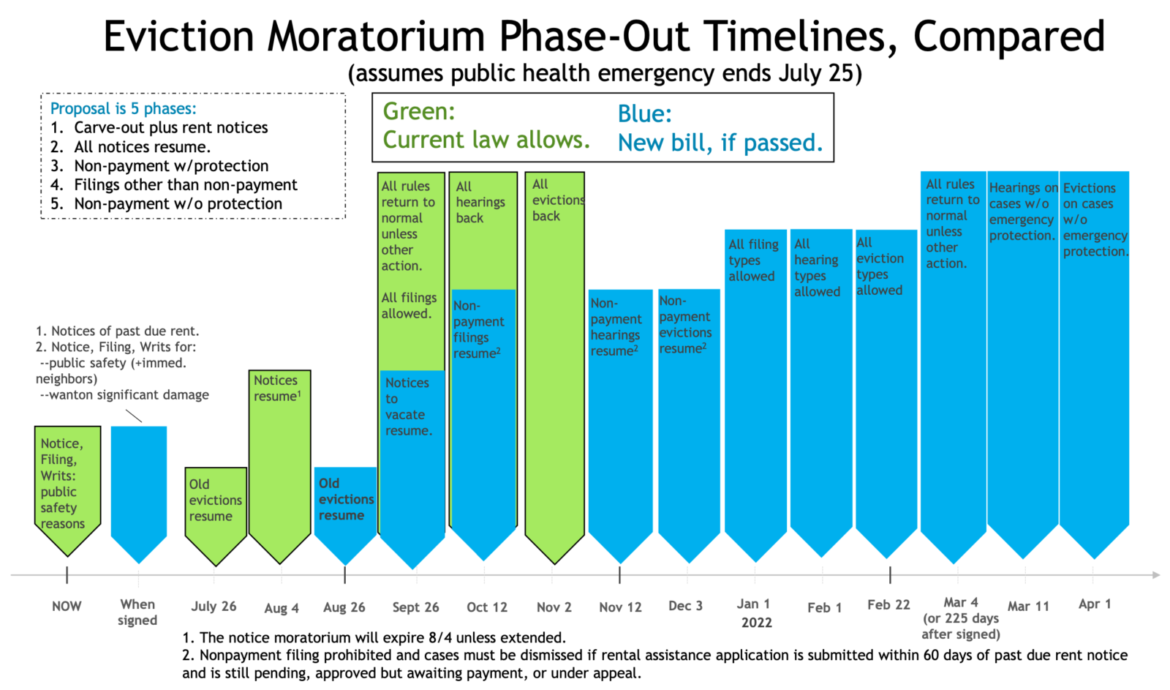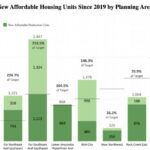In the Washington Post, July 13, 2021
The D.C. Council adopted a plan on Tuesday to gradually put an end to a slew of protections that have shielded residents during the coronavirus pandemic, including prohibitions that kept landlords from raising rents and evicting tenants.
If the mayor signs the legislation, which passed the council unanimously, the protections will sunset over the next several months.
The measure drew criticism both from tenant advocates who said it ends much-needed safeguards too soon and from landlords who said they need the evictions process to move faster.
The legislation establishes a plan for evictions to resume in stages. Landlords will be allowed to file right away to evict tenants who have caused significant damage to their buildings. A much larger number of evictions, those filed against any tenants who have fallen more than $600 behind on rent, can be filed in court beginning Oct. 12. But the law imposes a new requirement that landlords apply for Stay DC — the massive rent relief program funded by $350 million in federal grants — on behalf of tenants at least 60 days before moving to evict them.
Advertisement
The hope, council members said, is that most tenants will receive money from the program to cover what they owe and will avoid eviction.
“What we’re doing is trying to create more of a soft landing,” Chairman Phil Mendelson (D) said Monday.
The measure allows eviction filings for all causes, such as those for tenants who are paying their rent but have violated terms in their lease, to resume at the start of the new year. Mendelson said that the staggered calendar is necessary to prevent the city’s courts from being deluged with cases at once.
But landlords were frustrated that it could be nearly six additional months before they can move to evict.
“This is a gross and pervasive taking of the civil and property rights of every D.C. housing provider,” Dean Hunter, the chief executive of the landlord group Small Multifamily Owners Association, said in an interview. “We will examine all of our options including legal challenges. We’re going to continue to fight to access the courts. We lost today, but we will not stop fighting to gain access to the courts to exercise our rights.”
The bill also prohibits landlords from raising tenants’ rent for the rest of this year.
D.C. will let landlords evict dangerous tenants, but not raise rents
Several nonprofit organizations sent the council a letter on behalf of tenants, arguing that the bill would allow evictions to resume too quickly. The advocates suggested that no evictions should start earlier than December. “With unemployment still at high levels and vaccination still underway, especially for Black and Brown residents, now is not the time to end public health protections that have saved lives,” they wrote.
Mendelson described the measure as a sound compromise. “If the goal is to eliminate any more evictions for the rest of time, that’s not going to happen,” he said. “But if the goal is to get people to reduce their debt and pay their bills with the federal assistance, this does a better job of it than anything else I’ve seen.”
Under the legislation, utility companies will again be allowed to shut off gas, water or electricity starting in October at the homes of customers who have fallen behind on their bills during the pandemic. But the measure also requires companies to keep utilities running for an additional 90 days at the home of any customer who owes less than $600 or who receives public benefits including Medicaid, welfare, food stamps or rental assistance from the city’s rent relief program. It also says companies must keep providing utilities to any customer who sets up a payment plan and pays at least $10 a month.
The council also agreed Tuesday that it would no longer extend Mayor Muriel E. Bowser’s authority to declare a public health emergency past July 25.
Click here to see the full article
___________________________
DC Council Will Phase Out The City’s Eviction Moratorium
In the dcist, July 13, 2021
As D.C. emerges from a year and a half of pandemic-induced lockdown, lawmakers unanimously approved emergency legislation Tuesday that will gradually phase out tenant protections.
One of the strongest protections implemented during the pandemic is the District’s blanket ban on evictions, which prohibited landlords from removing tenants from their homes — for almost any reason. But the moratorium and other measures were tied to the city’s official public health emergency, and were only set to last until 60 days after the designation ends.
D.C.’s eviction moratorium will begin to phase out July 26 under legislation passed by the D.C. Council.Maya Brennan / Courtesy of D.C. Council
Mayor Muriel Bowser has said she plans to allow the public health emergency to lapse at the end of July.
The legislation creates a new set of eviction rules that will last until late February of next year, or 225 days after the measure is passed.
The gradual phase-out offers a “soft landing” for tenants, according to D.C. Council Chairman Phil Mendelson, but it has drawn criticism from both tenant advocates and landlord representatives.
The new measure allows the following:
- Landlords can resume sending notices of past due rent to tenants once the legislation is signed. The notice must include specific language under an amendment from Councilmember Elissa Silverman (I-At Large).
- On Sept. 26, landlords may begin sending notices for breaches of lease, but eviction filings for lease breaches can’t be submitted until Jan. 1.
- Landlords can begin filing nonpayment of rent cases Oct. 12, as long as the property owner has applied for relief through STAY DC and given the tenant a 60-day past due rent notice, and the tenant has not applied for or been denied assistance.
- Landlords can only pursue evictions for tenants who owe at least $600 in rent while the legislation is in effect.
Rent increases are prohibited for the rest of 2021. - Families facing immediate eviction must be provided options for assistance, and individuals with mental health issues must be offered “alternative housing arrangements,” before the eviction is carried out.
- If the tenant’s application for rent assistance is denied, the tenant and landlord must establish a rent payment plan within 14 days of the denial to avoid eviction proceedings.
- Tenants have a legal defense against eviction if they apply for rent help within 60 days of receiving a past due rent notice and the application is pending or under appeal.
- For tenants who were already scheduled for an eviction before the ban went into effect, landlords must provide 30-day notice informing the tenant of the new eviction date. Actual evictions for these tenants can resume Aug. 26, after the 30-day notice.
The legislation also places restrictions on utility disconnections post-pandemic. After Oct. 12, and until the act expires in February, utility providers can only disconnect service for customers who owe at least $600 in late bills and have not sought financial relief or an alternative payment plan.
The council also approved three amendments to the original proposal. An amendment from At-large Councilmember Elissa Silverman would require landlords to alert tenants of their rights in specific language when they send past-due rent notices.
“Tenants who get the notice will understand their rights and responsibilities without a bunch of jargon or threats or acronyms,” Silverman said during the council’s legislative meeting, adding that property owners will have specific guidance rather than “making up notices out of thin air.”
Another amendment introduced by Ward 5 Councilmember Kenyan McDuffie stipulates that the mayor must send a list of people who qualify for utility disconnection relief to the Office of People’s Counsel, in addition to the utility companies themselves. And an amendment from At-Large Councilmember Christina Henderson requires the mayor’s office to proactively reach out to individuals enrolled in a number of D.C.’s social services programs to inform them about relief through the city’s STAY DC programs.
The bill now goes to Bowser’s desk for her signature. (Eemergency legislation doesn’t require a second vote.)
Tenant advocates say the legislation still doesn’t provide enough protection for people whose eviction cases were pending before the pandemic. Beth Mellen with D.C. Legal Aid says there are roughly 300 D.C. families with old eviction cases that will be revived come July 26.
“We are worried about the timing,” Mellen says. “This is a really big change for tenants. We’ve all known it’s coming, but we want to make sure tenants understand what’s going on.”
The attorney wants the city to ensure that residents who don’t qualify for STAY DC money or have unpaid balances from before the pandemic can seek relief from D.C.’s Emergency Rental Assistance Program. That program is now tapped out and won’t receive more funding until the beginning of the new fiscal year in October. Mellen is also concerned about tenants who may receive a notice of past due rent and simply leave their homes, taking a large bill of unpaid rent with them.
Meanwhile, in a statement after the vote, the Apartment and Office Building Association of Metropolitan Washington said the group was “deeply concerned” by the provisions.
“The changes made to the final version of the bill go well beyond addressing providing relief to residents struggling financially due to COVID and dramatically alter Landlord-Tenant law well into 2022,” the statement read in part.
The Bowser administration has struggled to speedily deliver millions of dollars in rent assistance through its federally funded $352 million STAY DC fund. Since the program launched in April, the city has distributed less than 20% of the $200 million Congress allocated in December, D.C. Deputy Mayor for Planning and Economic Development John Falcicchiotold the Washington Post.
Advocates have been sounding an alarm about lingering issues with the STAY DC application process.
“We know the application is so onerous right now, and the administration really hasn’t made it an accessible, low-barrier program for people,” says Amber Harding with the Washington Legal Clinic for the Homeless. “We’re worried people are going to give up and landlords can go ahead and evict them.”
Landlords have also complained about the rent assistance program, saying it’s too complicated and time-consuming for property owners to receive back rent. It’s an especially urgent problem for small landlords, some of whom have gone months without rental income with no relief.
Dean Hunter, who lobbies on behalf of small landlords with the Small Multifamily Owners Association, has been pushing landlords to voice their discontent with councilmembers. In an email to the group’s members on Saturday, Hunter wrote that the bill “will make it almost impossible to evict anyone in the District” and will “create a new bureaucracy” that buries landlords in court proceedings.
“The bill is an excessive, overly broad taking of civil and property rights,” Hunter says. “It’s going to cause serious long-term harm to small housing providers.”
An earlier effort by Mendelson to loosen the eviction ban was roundly rejected by his colleagues. But with the public health emergency expected to wind down, lawmakers would have no choice but to create an off-ramp for tenants, the chairman said in a briefing on Monday.
“If we do nothing, utility and eviction protections will run out in October. If we do nothing, landlords can immediately file new eviction notices,” Mendelson said. “This is a more thoughtful end to the moratorium.”
Click here to read the full article







